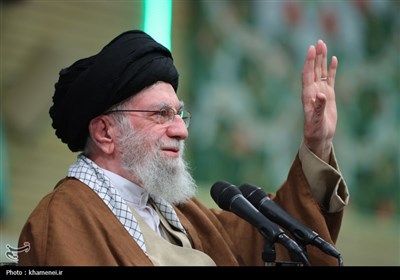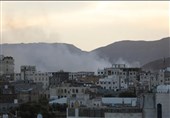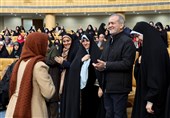Collaboration of Israeli Military Personnel Facilitated 'Al Aqsa Storm' Operation: Palestinian Official
TEHRAN (Tasnim) – An official in Palestinian Islamic resistance groups has informed Tasnim that Israeli military personnel with long-standing collaborations provided crucial information for the recent 'Al Aqsa Storm' operation.
A reliable source within the Palestinian resistance groups has revealed fresh details regarding the infiltration of Palestinian fighters into the structure of the Zionist regime's army during the 'Al Aqsa Storm' operation.
The Israeli regime's army, in an assessment report on the 'Al Aqsa Storm' operation, disclosed that between 800 to 1000 Palestinian forces launched attacks on 80 points, 20 districts, and 11 military bases of the Zionist army on Saturday.
In another section of the report, the Israeli army mentioned that Hamas had devised its recent operation "over a year ago" and had kept it highly secretive.
Collaboration of Israeli Military Personnel Aided Information Gathering for 'Al Aqsa Storm' Operation
A Palestinian official in the Islamic resistance groups told Tasnim that some of the information obtained during the infiltration phases had been acquired through long-time collaboration of certain Israeli military personnel with the resistance groups. This information played a crucial role in facilitating the infiltration of forces into Israeli districts, especially the military bases surrounding Gaza.
This official emphasized that this cooperation extended beyond mere intelligence matters and, for some time now, Palestinians have also been sourcing a significant portion of their equipment from Israeli soldiers and military personnel.
Numerous reports in Hebrew-language sources have underscored the importance of bolstered security measures within the Israeli military. Notably, the issue of drug addiction among Israeli soldiers, particularly reservists, has been addressed, with claims that many soldiers exchange their weapons for money or narcotics with Palestinians.
According to Israeli newspaper Maariv, after the construction of a separation wall between occupied Palestine and Egypt, Palestinian groups have shown interest in obtaining weapons from Israeli military bases.
On December 16, 2021, Israel's Channel 13 reported the theft of more than 100,000 bullets from an arsenal of M16 rifles at a military base of the Alexandroni Brigade in northern Palestine. However, the Israeli police announced that over 150,000 bullets had been stolen.
In recent years, Palestinian groups, particularly their special forces, have predominantly used equipment that is also in the possession of the Israeli army and military personnel.
Reports indicate that Palestinian groups obtain their supply of arms through three main means: purchasing weapons from arms traffickers in occupied territories, from the Zionist regime's arsenals and arms depots, and collaborating with certain Israeli military forces who have renounced Zionism.
Tasnim had previously explored this, referring to it as the "Secret Palestinian Army," whose primary responsibility is to procure weapons from these depots.
In another report in May 2019, Maariv reported that 46 M16 rifles had been stolen from a military base in the Western Galilee region in just one month, and many of them were never recovered.
A number of Palestinian fighters and the perpetrators of a series of recent attacks on Israelis have used the same firearm in their operations.
The thefts from the Israeli regime's arsenals are not limited to light and individual weapons. In 2012, Haaretz newspaper reported that items worth $14 million had been stolen from Israeli military bases, including Gill anti-tank guided missiles.
With a notable increase in burglaries from Israeli military bases, the report highlighted that robbers often easily breach security and steal military equipment, bullets, rifles, generators, and even military vehicles.
In December 2020, the Israeli daily “Yedioth Ahronoth” reported that a large number of personnel of the 13th Battalion of the Golani Brigade at the “Kisonim” settlement had been expelled after a considerable amount of drugs was seized from them.
According to an unnamed Israeli officer at the logistics directorate, the robberies are often committed in cooperation with the Israeli military forces stationed at these bases.
Israeli sources have indicated that drug addiction is on the rise among military forces. After the disclosure of weapon thefts from Israeli military bases in 2009, drug addiction emerged as a significant factor in arms trade between Israeli officers and Palestinians.
Such security breaches in the Israeli army have put pressure on many Israeli army commanders. It appears that after the conclusion of the “Al-Aqsa Storm” operation, a large number of senior military and security commanders of the Zionist regime will be punished severely or dismissed.
Considering the sharing of responsibilities among several Israeli organizations, the Shabak (Shin Bet) –Israel's internal security service which is tasked with gathering intelligence about the Palestinian resistance groups-, the Aman (Israeli military intelligence), and the police have shown the highest degree of weakness.
However, the criticisms are chiefly targeted at the top officials, from the prime minister to the minister of defense and the chief of the general staff.
During the Yom Kippur War 50 years ago, the consequences of Israel being surprised by the outbreak of the war resulted in the collapse of the then government. Those at fault tried to put the blame all on Aman as one of the most important intelligence services of the Zionist regime.
In that juncture, intelligence organizations like Mossad knew about the outbreak of war, but the negligence of the government officials, particularly prime minister Golda Meir and defense minister Moshe Dayan, and their disregard for the obtained intelligence resulted in surprise. But this time, even the Zionist regime’s intelligence organizations had no knowledge of the Al-Aqsa Storm operation, although the Israeli army said the plans of the Palestinians had been in progress for over a year.
The fact that a large number of the Zionist regime’s military and security forces have been cooperating with the resistance groups and with the intelligence organizations of Iran has forced the regime to eliminate many of its forces in recent years.
Such an approach adopted by the Zionists has resulted in the growing number of suspicious deaths of Israeli officers, non-commissioned officers, and soldiers. Nevertheless, many of those deaths have remained undisclosed under the strict regulations on the censorship of military news.
In the meantime, the Palestinian resistance groups’ success in infiltrating the Israeli army and intelligence services has posed new major challenges to the regime’s leaders.






